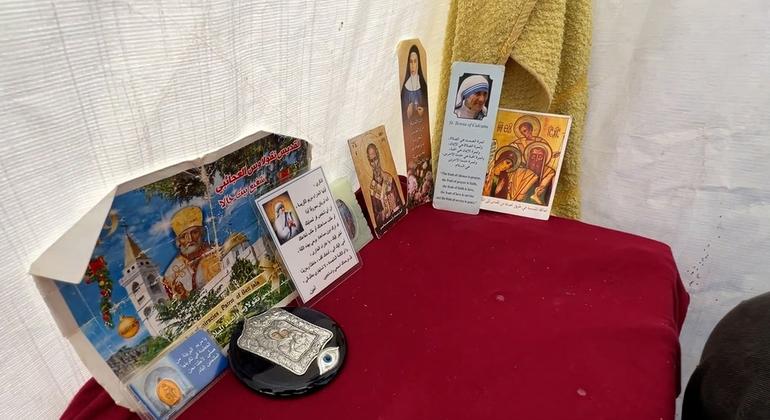In the Al-Mawasi area, west of Khan Younis, Tony Al-Masri, known by his nickname “Abu Asaad”, finds himself displaced again this year, with his wife Amal and their neighbor Hossam, in front of their modest tent. As they drink coffee, they nostalgically remember the Christmas celebrations they used to enjoy, now dimmed by the weight of war. At 78 years old, Tony carries the memory of his first expulsion during the Nakba in 1948, when his family fled from Haifa to refugee camps in Lebanon, before settling in Gaza.
“This is not the first time I have lost my home and loved ones,” reflects Tony, whose memory of a vibrant and lively Gaza during Christmas clashes with the harsh current reality. Throughout his life, he has cherished family moments, from attending church to sharing festive meals. However, for the second consecutive year, the festivities have been erased by the conflict plaguing the region.
The memories of nights celebrating Christmas with laughter and decorations become a painful reminder of what has been lost. “The celebrations used to start after midnight, and my sons and daughters were by my side. But now, there is no one here,” he laments. The loneliness he feels amidst the suffering of his people is overwhelming and palpable.
Tony’s wife, Amal, is equally lost, searching for reasons to celebrate in a context of constant adversity. Every day, she faces unimaginable challenges. Their neighbor and friend, Aunt Umm Asaad, adds to their despondency: “There is no joy, no smiles, no holidays. We only live in a constant state of alert.” This situation reflects the atmosphere of uncertainty that has dominated Gaza since the beginning of the current conflict, which has lasted for almost 15 months.
However, amidst the devastation, gestures of solidarity emerge that offer a ray of hope. Hossam Al-Khalili, friend and neighbor of Tony, has decided to move to Khan Younis to support the couple. “He is like a father to me,” says Hossam, emphasizing the importance of community in the face of adversity. His family has made Tony and Amal part of their daily life, sharing meals and providing company, allowing them to evade the loneliness typically faced by displaced people.
Tony, looking towards the future, longs for a return to peace and the celebration of life. He expresses his wish for the war to end and for everyone to resume the festivities that characterize his culture. “I hope that 2025 will be a year of kindness for all people, especially the Palestinian people,” he concludes, harboring hope for better days and a reunion with his loved ones. Tony’s determination and his longing for a spiritual rebirth are a testimony to the resilience of the human spirit, always seeking light in the midst of darkness.
Source: MiMub in Spanish
